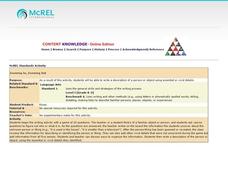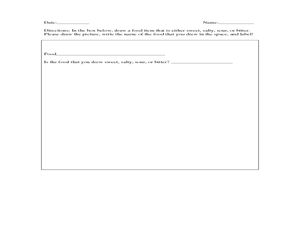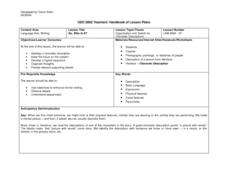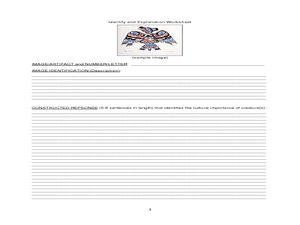Curated OER
“THE LORAX” by Dr. Seuss
Few children's books convey the message of conservation as well as Dr. Seuss' The Lorax. Read the story aloud, emphasizing the interconnectedness of plants and animals in an ecosystem and discussing different ways people can help the...
Museum of Tolerance
Developing Media Literacy
To protect young people from questionable content, many schools limit access. This resource suggests that because learners can so readily avail themselves to unrestricted Internet access, it is vital for 21st century learners to develop...
Nosapo
Shopping for Clothing
Let's go shopping! A series of activities focus on vocabulary words related to articles of clothing and shopping for clothes. Additionally, learners complete sentences using how much and how many.
K12 Reader
Literature About Chicago: Prose vs. Poetry
In this comprehension exercise, readers compare Carl Sandburg's "Chicago" to a description of the city from Upton's Sinclair's The Jungle.
Rochester Institute of Technology
Artificial Eye
Scientists in California developed a bionic eye that allows blind people to see edges of objects in black and white and costs $145,000. In the activity, groups of scholars discuss bioengineering, focusing on the human eye. They then...
Curated OER
Whether/Weather/Wether
Is it whether, weather, or wether? Learners explore the differences between these three words using examples and descriptions. They conclude by taking an interactive test.
Curated OER
The Bible
In this Bible worksheet, students fill in the blanks to sentences about the Bible, and match pictures to words of where you read the Bible. Students complete 7 problems total.
Curated OER
Colorful Creative Writing Rebus
Students read rebus samples from various sources. They write poems about colorful places, including detailed descriptions of people, scenery, and objects. Students create small, relevant illustrations to communicate meaning using symbols...
Curated OER
Who's Who?
In this ESL worksheet, students listen to 12 descriptions of different people. Students match the descriptions of people with their correct pictures.
Curated OER
Zooming In, Zooming Out
Students develop their writing skills. In this writing lesson, students play a word game to help them formulate a plan to write descriptions of people or objects using descriptive words.
Curated OER
Terrific Taste Buds
Learners explore descriptive writing by eating food in class. In this descriptive word lesson, students assess different foods in class such as jelly beans and utilize their vocabulary to describe the taste. Learners read the story...
Curated OER
Who Is Who?
In this who is who worksheet, students draw a line from 6 people who are speaking on the sides of the worksheet to the word that best describes each one in the middle. Students answer 3 short answer questions at the bottom of the worksheet.
Curated OER
How Are Stars Like People?
A beautifully written lesson plan delves into a beautiful topic: stellar population. Engage aspiring astronomers with activities that examine human populations and then transition onto the stars of the universe. Data and photographs for...
Curated OER
So, Who Is It?
Learners brainstorm adjectives that describe people, discuss different ways of comparing and/or finding contrast in describing a person, and write drafts of their descriptions.
Curated OER
Are We There Yet?
Students continue to study rhyming words. They use words and illustrations to help develop their vocabulary.
Curated OER
Multiplication Stories
Second graders solve various multiplication math word problems involving cars and people, fish and fish bowls, and tables and table legs. They write and solve multiplication story problems related to whole numbers, addition, subtraction,...
Curated OER
Stories Behind Pacific Northwest First Nations' Images
Students investigate Canadian culture by examining mascots of the 2010 Olympics. In this Canadian history lesson, students read a Vancouver Olympics guide to identify three Canadian mascots and their importance to the First Nations...
Curated OER
Milkweed Plants
Second graders view milkweed plants (or pictures). The describe the plant and discuss ways some butterflies use it as a food source. Students view four pictures of different phases of a milkweed plant's life cycle. They discuss the...
Curated OER
Weird Science
Students design their perfect friend. In this adjectives lesson students imagine having a super-computer that analyzes people. Students work to solve personality description word puzzles. Students choose adjectives that describe their...
Curated OER
Uncommon Heroes of Today
Students create a photo-biography of someone they consider a real life hero. In this character sketch lesson, students define a hero and identify heroic characteristics in short stories. Students use descriptive words to write about...
Curated OER
The Grapevine-Teaching Storytelling to English Language Learners
Students participate in a game designed to aid in storytelling. They spread a rumor to each member of their team using information found in the accompanying worksheets. Students earn points when they report their rumor correctly. ...
Curated OER
Jim Thorpe's Bright Path
Young scholars read about the life of Jim Thorpe and answer focus lessons about the book. In this Jim Thorpe lesson, students celebrate the American Indian culture and learn of the hardships Jim Thorpe overcame. Young scholars find...
Curated OER
Describing Words
First graders brainstorm adjectives, recognize adjectives within text read by teacher, identify sentences that contain adjectives using Hyperstudio stack, and write two descriptive sentences for abstract image they create.
American Psychological Association
How Psychology Benefits Society
How do people form their opinions about certain social issues? Scholars research current global issues to find out how psychology plays a role in swaying thoughts. Using blogs, writings, and presentations, they uncover why people think...

























